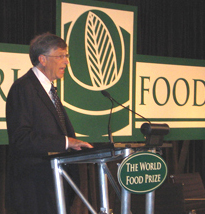At the World Food Prize Forum in Des Moines on Thursday, Microsoft founder and philanthropist Bill Gates spoke out in support of biotechnology to help feed the world.
“We have to develop crops, including new inputs to go with them that can grow in a drought,” Gates said. “We have to have crops that can survive a flood, that can resist pests and new diseases. We need higher yields on the same land, despite more difficult weather. And we will never get there without a continuous and urgent, science-based search to increase productivity, especially focused on the needs of small farms in the developing world.”
 Gates took environmentalists to task for having an idealistic attitude that jeopardizes the ability of developing countries to grow enough food. “They have tried to restrict the spread of biotechnology into sub-Saharan Africa without regard to how much hunger and poverty might be reduced by it.”
Gates took environmentalists to task for having an idealistic attitude that jeopardizes the ability of developing countries to grow enough food. “They have tried to restrict the spread of biotechnology into sub-Saharan Africa without regard to how much hunger and poverty might be reduced by it.”
While Gates said that major breakthroughs in the fight against hunger and poverty are now within reach, he cautioned that progress toward alleviating global hunger is “endangered by an ideological wedge that threatens to split the movement in two.” On one side, he said, there are groups that support technological solutions to increase agricultural productivity without proper regard to environmental and sustainability concerns. On the other, there are those who react negatively to any emphasis on productivity.
“It’s a false choice, and it’s dangerous for the field,” Gates said. “It blocks important advances. It breeds hostility among people who need to work together. And it makes it hard to launch a comprehensive program to help poor farmers. The fact is, we need both productivity and sustainability—and there is no reason we can’t have both.”
Let’s put this in the Blog Action Day Climate Change category under the topic of Food Production. We can have both – productivity and long term sustainability. In fact, we already do have both here in the United States. The majority of our nation’s farms are models of both productivity and sustainability for the world. We are using less land, less fertilizer, and less energy to produce more food than ever before. If developing nations are able to utilize biotech crops, we can and will be able to feed the billion people across the globe who are suffering from malnutrition, as well as the increasing global population. I’m not a big fan of Bill Gates, but I have to applaud him today for standing up to radical environmentalists who want us to move backward instead of forward.
